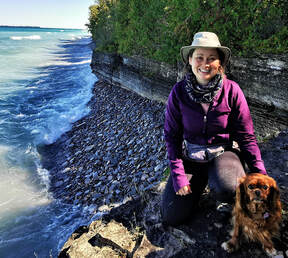
Dr. Mélanie Guigueno (Principal Investigator)
I'm a passionate behavioural ecologist, neuroecologist, and ecotoxicologist. Growing up on the Canadian Prairies, I was first introduced to research at the Delta Marsh Field Station (University of Manitoba) by Spencer Sealy, where I examined behavioural defences of hosts of avian brood parasites as part of Honours and MSc theses. For my PhD at the University of Western Ontario, I examined sex and seasonal differences in cognition and the brain of the brood-parasitic brown-headed cowbird, with David Sherry and Scott-MacDougall-Shackleton. As a Mitacs and FRQNT postdoctoral fellow, I worked with Jessica Head (McGill) and Kim Fernie (Environment and Climate Change Canada) to examine the effects of environmental contaminants on the avian brain, behaviour and physiology. Finally, I returned to fundamental research as a L'Oréal-UNESCO / Royal Society of Canada NSERC Postdoctoral Fellow to work with Simon Reader, examining social behaviour and the brain of Trinidadian guppies. In January 2019, I started a tenure-track assistant professor position in the Department of Biology at McGill, fulfilling my dream of leading my own lab!
I'm a passionate behavioural ecologist, neuroecologist, and ecotoxicologist. Growing up on the Canadian Prairies, I was first introduced to research at the Delta Marsh Field Station (University of Manitoba) by Spencer Sealy, where I examined behavioural defences of hosts of avian brood parasites as part of Honours and MSc theses. For my PhD at the University of Western Ontario, I examined sex and seasonal differences in cognition and the brain of the brood-parasitic brown-headed cowbird, with David Sherry and Scott-MacDougall-Shackleton. As a Mitacs and FRQNT postdoctoral fellow, I worked with Jessica Head (McGill) and Kim Fernie (Environment and Climate Change Canada) to examine the effects of environmental contaminants on the avian brain, behaviour and physiology. Finally, I returned to fundamental research as a L'Oréal-UNESCO / Royal Society of Canada NSERC Postdoctoral Fellow to work with Simon Reader, examining social behaviour and the brain of Trinidadian guppies. In January 2019, I started a tenure-track assistant professor position in the Department of Biology at McGill, fulfilling my dream of leading my own lab!
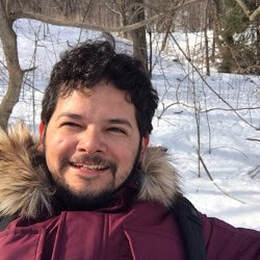
Patrick Pereira, Postdoctoral researcher and lab manager (2023-present; visiting PhD student 2020)
In 2020, Patrick visited our lab as a PhD student from the Universidade Federal do Pará in northern Brazil, supervised by Cristovam Guerreiro Diniz. His PhD thesis research examined seasonal differences in cellular and genomic measures of the hippocampus of shorebirds with differing migration patterns.
Lucky for us, Patrick has returned to our lab as a post-doc. He is investigating the impacts of the neonicotinoid insecticide imidacloprid on migratory behaviour and neurogenesis and glial cell morphology in the hippocampus of European starlings (Sturnus vulgaris). Imidacloprid is a commonly used insecticide in agriculture, acting on the central nervous system.
Patrick has extensive field and laboratory experience and has published much within the field of neuroecology (see Research Gate page here).
In 2020, Patrick visited our lab as a PhD student from the Universidade Federal do Pará in northern Brazil, supervised by Cristovam Guerreiro Diniz. His PhD thesis research examined seasonal differences in cellular and genomic measures of the hippocampus of shorebirds with differing migration patterns.
Lucky for us, Patrick has returned to our lab as a post-doc. He is investigating the impacts of the neonicotinoid insecticide imidacloprid on migratory behaviour and neurogenesis and glial cell morphology in the hippocampus of European starlings (Sturnus vulgaris). Imidacloprid is a commonly used insecticide in agriculture, acting on the central nervous system.
Patrick has extensive field and laboratory experience and has published much within the field of neuroecology (see Research Gate page here).
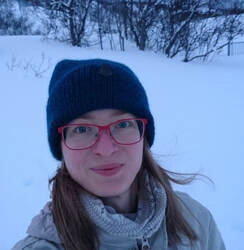
Anna Lippold, PhD student (2020-present)
Anna completed her Master’s degree at the Arctic University of Tromsø, Norway, where she researched temporal trends of persistent organic pollutants in Barents Sea polar bears under the supervision of Dr. Heli Routti (Norwegian Polar Institute). After two additional years continuing research on contaminants exposure in polar bears, she joined the Guigueno lab as a PhD student. During her PhD, Anna will explore neural correlates of spatial behaviour, with a focus on neurogenesis, in ring-billed gulls during breeding, and the effect of anthropogenic contaminants on both the birds’ brains and their spatial behaviour.
Anna completed her Master’s degree at the Arctic University of Tromsø, Norway, where she researched temporal trends of persistent organic pollutants in Barents Sea polar bears under the supervision of Dr. Heli Routti (Norwegian Polar Institute). After two additional years continuing research on contaminants exposure in polar bears, she joined the Guigueno lab as a PhD student. During her PhD, Anna will explore neural correlates of spatial behaviour, with a focus on neurogenesis, in ring-billed gulls during breeding, and the effect of anthropogenic contaminants on both the birds’ brains and their spatial behaviour.
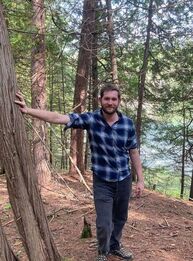
Bryan Hughes, PhD student (2023 - present)
Bryan completed his undergraduate degree at Trent University, focusing on fluorescence in North American flying squirrels with Dr. Jeff Bowman for his Honours thesis project. He then went on to complete his MSc at Laurentian University under the supervision of Dr. Albrecht Schulte-Hostedde and Dr. Jeff Bowman, where he examined animal personality in small mammals. Currently, Bryan is completing a PhD at McGill University, exploring animal movement, spatial cognition, and genetics of food-storing corvids.
Bryan completed his undergraduate degree at Trent University, focusing on fluorescence in North American flying squirrels with Dr. Jeff Bowman for his Honours thesis project. He then went on to complete his MSc at Laurentian University under the supervision of Dr. Albrecht Schulte-Hostedde and Dr. Jeff Bowman, where he examined animal personality in small mammals. Currently, Bryan is completing a PhD at McGill University, exploring animal movement, spatial cognition, and genetics of food-storing corvids.
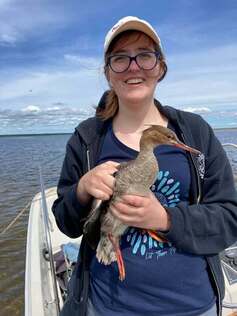
Emily Burt, MSc student (2022 – present)
Emily is an MSc student who is passionate about birds and behavioural ecology. Following an Honours thesis working with a population of red-breasted mergansers that exhibit conspecific brood parasitism, she wanted to further pursue research on this topic and its link to kin selection. For her Master’s thesis, she is investigating the role of kin selection in the evolution of conspecific brood parasitism and how it dictates host-parasite interactions using behavioural observation and molecular analyses.
Emily is an MSc student who is passionate about birds and behavioural ecology. Following an Honours thesis working with a population of red-breasted mergansers that exhibit conspecific brood parasitism, she wanted to further pursue research on this topic and its link to kin selection. For her Master’s thesis, she is investigating the role of kin selection in the evolution of conspecific brood parasitism and how it dictates host-parasite interactions using behavioural observation and molecular analyses.
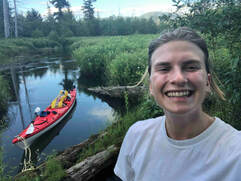
Anya Mueller, USRA & Independent student (2022 – present)
I am an aspiring biologist working my way through my BSc at McGill. I love all topics in biology but am especially excited by evolution and ecology. During my undergrad I have been involved in various research projects in different labs at McGill. This summer, 2022, I began working with the Guigueno Lab as a USRA student. I completed a field season in Delta Marsh, Manitoba where we collected, among other data, eggshell microbiome samples. This coming year I am excited to explore the links between micro- and macroecology with these samples.
I am an aspiring biologist working my way through my BSc at McGill. I love all topics in biology but am especially excited by evolution and ecology. During my undergrad I have been involved in various research projects in different labs at McGill. This summer, 2022, I began working with the Guigueno Lab as a USRA student. I completed a field season in Delta Marsh, Manitoba where we collected, among other data, eggshell microbiome samples. This coming year I am excited to explore the links between micro- and macroecology with these samples.
Alumni
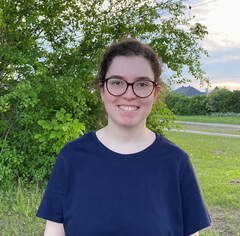
Sereena Moore, MSc student (2019 – 2023)
Sereena is interested in animal behaviour, its link to the brain, and ecotoxicology. For her thesis project, For her MSc, Sereena is examed cell proliferation in the hippocampus of a migratory songbird, the European starling. Specifically, she examined how this fine-scale brain measure changed with development and wth exposure to a widely-used pesticide, chlorpyrifos.
Sereena is interested in animal behaviour, its link to the brain, and ecotoxicology. For her thesis project, For her MSc, Sereena is examed cell proliferation in the hippocampus of a migratory songbird, the European starling. Specifically, she examined how this fine-scale brain measure changed with development and wth exposure to a widely-used pesticide, chlorpyrifos.
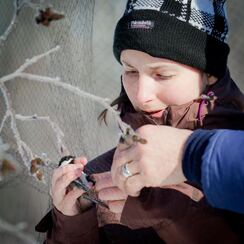
Dr. Claire Bottini, Lab Manager (Jan - Aug 2023)
Claire completed her MSc in France working on hoopoes parental feeding behaviour. She then did her PhD at Western University under the supervision of Dr. Scott MacDougall-Shackleton focusing on the combined effects of methylmercury and food stress exposure on songbird’s physiology and seasonal transition. Joining the Guigueno Lab as postdoctoral researcher and lab manager, Claire helps the students with their project and questions and particularly focuses on the effects of chlorpyrifos pesticide exposure in the brain of European starlings.
More about Claire's work can be found here.
Photo by Simon Lamarre.
Claire completed her MSc in France working on hoopoes parental feeding behaviour. She then did her PhD at Western University under the supervision of Dr. Scott MacDougall-Shackleton focusing on the combined effects of methylmercury and food stress exposure on songbird’s physiology and seasonal transition. Joining the Guigueno Lab as postdoctoral researcher and lab manager, Claire helps the students with their project and questions and particularly focuses on the effects of chlorpyrifos pesticide exposure in the brain of European starlings.
More about Claire's work can be found here.
Photo by Simon Lamarre.

Dr. Jeff Martin, Lab Manager (2021-2022)
Jeff completed his MSc and PhD at Western University working with Drs. David Sherry and Yolanda Morbey, exploring decision-making in captive Canada jays across a variety of contexts. Working in the Guigueno Lab as lab manager, Jeff played a crucial role in setting up the cowbird aviaries for Elsa Mardiné's PhD project and leading a field team at Delta Marsh, on the south shore of Lake Manitoba (formerly Delta Marsh Field Station).
More about Jeff's work can be found here.
Jeff completed his MSc and PhD at Western University working with Drs. David Sherry and Yolanda Morbey, exploring decision-making in captive Canada jays across a variety of contexts. Working in the Guigueno Lab as lab manager, Jeff played a crucial role in setting up the cowbird aviaries for Elsa Mardiné's PhD project and leading a field team at Delta Marsh, on the south shore of Lake Manitoba (formerly Delta Marsh Field Station).
More about Jeff's work can be found here.
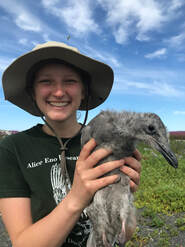
Jenna Schlener, MSc student (2019 – 2022)*
Jenna completed her Bachelor’s degree at College of the Atlantic where she majored in Human Ecology. For her senior thesis, she conducted a study on individual variation in habitat use and foraging behavior in herring gulls. Her curiosity about causes and consequences of individual variation in behaviour led her to continue investigating the topic on kittiwakes in Alaska. Her MSc thesis will explore the connections between personality, foraging behaviour, and reproductive success.
*Jenna’s primary co-supervisor is Kyle Elliott in the Department of Natural Resource Sciences.
Jenna completed her Bachelor’s degree at College of the Atlantic where she majored in Human Ecology. For her senior thesis, she conducted a study on individual variation in habitat use and foraging behavior in herring gulls. Her curiosity about causes and consequences of individual variation in behaviour led her to continue investigating the topic on kittiwakes in Alaska. Her MSc thesis will explore the connections between personality, foraging behaviour, and reproductive success.
*Jenna’s primary co-supervisor is Kyle Elliott in the Department of Natural Resource Sciences.
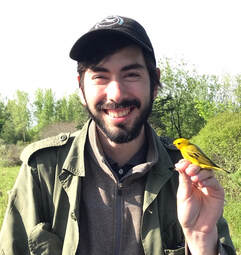
Antoine Turcotte-van de Rydt, MSc student (2019 – 2021)
Antoine completed his MSc in the summer of 2021. He is passionate about everything related to birds, especially topics related to their life history and behaviour. He enjoys field work and hopes to work in conservation. Antoine examined the association between clutch abandonment by hosts of avian brood parasites and: 1) corticosterone (field work) and 2) brood value (meta-analysis). Antoine’s field work was conducted on a population of yellow warblers in Southwestern Michigan.
Antoine completed his MSc in the summer of 2021. He is passionate about everything related to birds, especially topics related to their life history and behaviour. He enjoys field work and hopes to work in conservation. Antoine examined the association between clutch abandonment by hosts of avian brood parasites and: 1) corticosterone (field work) and 2) brood value (meta-analysis). Antoine’s field work was conducted on a population of yellow warblers in Southwestern Michigan.
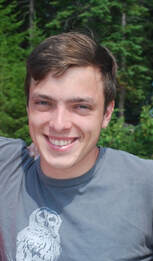
William von Herff, BSc Honours student (2020-2021)
William studied how oxygen delivery capabilities, through the proxy of hematocrit values, change across the tree of life. My Honours project consisted of creating a large-scale phylogenetic analysis of hematocrit values spanning the phylum chordata and looking to identify factors at the species level, such as diet, locomotion, and evolutionary history, and at the individual level, such as age and sex, that may play a role in affecting hematocrit values, and therefore oxygen delivery capability. Through this lens, this project aimed to shed light on the evolutionary history of chordates.
William studied how oxygen delivery capabilities, through the proxy of hematocrit values, change across the tree of life. My Honours project consisted of creating a large-scale phylogenetic analysis of hematocrit values spanning the phylum chordata and looking to identify factors at the species level, such as diet, locomotion, and evolutionary history, and at the individual level, such as age and sex, that may play a role in affecting hematocrit values, and therefore oxygen delivery capability. Through this lens, this project aimed to shed light on the evolutionary history of chordates.
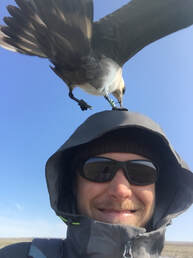
Tommy O’Neill Sanger, BSc Honours & Independent study student (2019-2020)
Tommy is interested in the behavioural impacts of ecological change, particularly in the context of the Arctic, and the use of passive monitoring techniques to document them. Tommy’s Honours project draws links between predation risk and the vocal behaviour of avian communities in the Arctic. Using automated bioacoustics and a deep learning detector, we are analyzing the quantity and diel timing of vocal activity in relation to nest predation rates within a network of remote field sites.
Tommy is interested in the behavioural impacts of ecological change, particularly in the context of the Arctic, and the use of passive monitoring techniques to document them. Tommy’s Honours project draws links between predation risk and the vocal behaviour of avian communities in the Arctic. Using automated bioacoustics and a deep learning detector, we are analyzing the quantity and diel timing of vocal activity in relation to nest predation rates within a network of remote field sites.
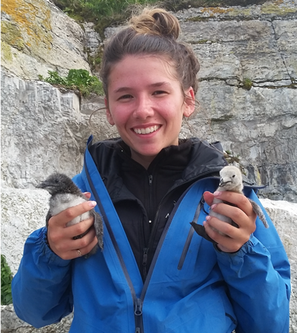
Christina Petalas, BSc Honours student (2019-2020)
Christina is interested in how sympatric species sufficiently differentiate their ecological niches in order to co-exist. Specifically, she studies whether foraging partitioning occurs in seabird species that breed sympatrically in the Mingan Archipelago within the Gulf of St-Lawrence. Seabirds are intriguing because they form large colonies composed of several populations of different species with seemingly apparent overlapping diets and foraging areas. Christina uses GPS-tracking and foraging observations to show how these colonial seabirds are segregating components of their foraging strategies across space and prey choice and how these characteristics may be a consequence of alleviating high interspecific competition, providing insight on multispecies colonial living. Christina is now an MSc student in Kyle Elliott's lab at McGill's Macdonald Campus.
Christina is interested in how sympatric species sufficiently differentiate their ecological niches in order to co-exist. Specifically, she studies whether foraging partitioning occurs in seabird species that breed sympatrically in the Mingan Archipelago within the Gulf of St-Lawrence. Seabirds are intriguing because they form large colonies composed of several populations of different species with seemingly apparent overlapping diets and foraging areas. Christina uses GPS-tracking and foraging observations to show how these colonial seabirds are segregating components of their foraging strategies across space and prey choice and how these characteristics may be a consequence of alleviating high interspecific competition, providing insight on multispecies colonial living. Christina is now an MSc student in Kyle Elliott's lab at McGill's Macdonald Campus.

Adrian Foster (2018-2019, Honours student)*
Adrian studied the effect of stress on the propensity to use social learning in wild and domestic populations of Trinidadian guppies. He then assisted in the research of Raina Fan, developing an immunofluorescence protocol to visualize neuronal activation in the guppy brain.
*Adrian was co-supervised by Simon Reader
Adrian is currently (summer 2020) working with Professor Patricia Turner at the University of Guelph on a project investigating the effect of habitat complexity on the display of agonistic behaviours in mice. He is working toward his Masters at the University of Toronto. Adrian is broadly interested in Animal Behaviour/Ecology and Biostatistics, and is hoping to pursue a career in academic research.
Adrian studied the effect of stress on the propensity to use social learning in wild and domestic populations of Trinidadian guppies. He then assisted in the research of Raina Fan, developing an immunofluorescence protocol to visualize neuronal activation in the guppy brain.
*Adrian was co-supervised by Simon Reader
Adrian is currently (summer 2020) working with Professor Patricia Turner at the University of Guelph on a project investigating the effect of habitat complexity on the display of agonistic behaviours in mice. He is working toward his Masters at the University of Toronto. Adrian is broadly interested in Animal Behaviour/Ecology and Biostatistics, and is hoping to pursue a career in academic research.
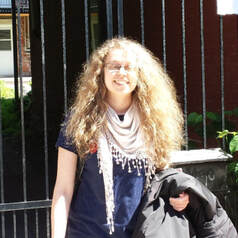
Mathilde Colinet (2018, MSc Intern)*
Mathilde examined the effect of past and present predation risk on social learning in Trinidadian guppies as part of an internship for her MSc at the Université de Namur and Universtié catholique de Louvain.
*Mathilde was co-supervised by Simon Reader
Mathilde is a laboratory technician at the Université de Namur and is working toward her PhD.
Mathilde examined the effect of past and present predation risk on social learning in Trinidadian guppies as part of an internship for her MSc at the Université de Namur and Universtié catholique de Louvain.
*Mathilde was co-supervised by Simon Reader
Mathilde is a laboratory technician at the Université de Namur and is working toward her PhD.